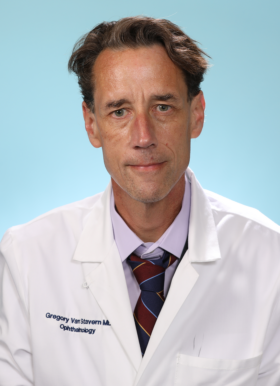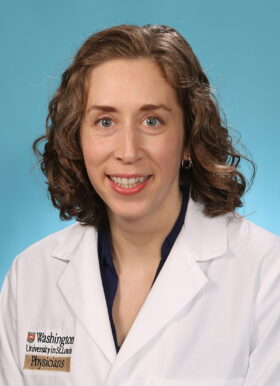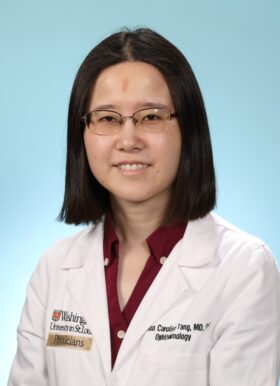Program Description
The Neuro-Ophthalmology Fellowship is a one-year, AUPO compliant, intensive clinical fellowship at one of the premier medical institutions in the United States. The clinical training focuses on the outpatient diagnosis and management of neuro-ophthalmologic conditions, including afferent and efferent disorders, in particular idiopathic intracranial hypertension, optic neuritis, giant cell arteritis, cranial nerve palsies, myasthenia gravis, pupillary abnormalities, and cortical visual disorders. Fellows will work primarily at Washington University in St. Louis, but will also attend a weekly clinic at the St. Louis VA Hospital to add diversity to their clinical experience. Fellows will work with Dr. Gregory Van Stavern, Dr. Leanne Stunkel and Dr. J. Banks Shepherd. Fellows will also have the opportunity to take a leadership role in teaching residents while rotating at the University Eye Service and at the VA. Ophthalmology-trained candidates with an interest in strabismus surgery will have the opportunity to work closely with Dr. Shepherd, an expert in adult strabismus surgery, evaluating and treating adult strabismus with an emphasis on the sensorimotor examination, surgical planning, and exposure to a wide variety of surgical techniques. There are ample opportunities for fellows to perform clinical research. The Neuro-Ophthalmology service has collaborative research and clinical relationships with the Neuroradiology, Multiple Sclerosis and Neuroimmunology, Neuro-Otology and Neuromuscular services, among others.
Director
Length of Fellowship
1 year
Number of positions per year
1
Starting Date
Approx. July 7
Application deadline
Rolling applications
Stipend
Yes- PGY5 scale
WUSTL-Stipend Scale
Actively involved in resident education
Yes
Research required
Clinical
Block time assigned to research
Flexible
Qualifications
This position is currently limited to applicants graduating from an ACGME-accredited U.S. Ophthalmology or Neurology residency program.
How to apply
For more information about the fellowship, please visit SFMatch.org
Application Requirements:
- Letter of interest/ personal statement
- Curriculum vitae
- 3 letters of recommendation
Fellows have the opportunity to work closely with our Neuro-Ophthalmology faculty including Gregory Van Stavern, MD, J. Banks Shepherd III, MD and Leanne Stunkel, MD.

Gregory Van Stavern, MD
Robert C. Drews Professor, Ophthalmology and Visual Sciences; Chair to our Clinical Research Committee
- Email: vanstaverng@wustl.edu
More about the program
Unique aspects:
- Washington University in St. Louis School of Medicine serves as a tertiary referral center for a large catchment area, and thus a wide range of pathology is represented.
- Clinical experience is diverse given the varied training settings (Washington University in St. Louis, University Eye Service, and the St. Louis VA Hospital)
- Opportunity to work with 3 neuro-ophthalmology faculty members with varied training backgrounds (both neurology and ophthalmology trained).
- Minimal travel to clinical sites (the VA is less than 2 miles away from the main campus).
- Exposure to many different populations: privately insured, Medicare and Medicaid, uninsured, and the veteran population.
- Washington University has a dedicated consult and trauma attending, allowing fellows to focus on their fellowship. This minimizes the burden of call and consult staffing for subspecialty fellows.
- Fellows play a major role in resident and medical student education, which is very rewarding, as the residents the Washington University in St. Louis are among the best in the world, and approach clinical and research projects with intelligence, motivation, and hard work.
Research Opportunities (these are just highlights, many smaller scale projects are added continually):
Gregory Van Stavern has an impressive research dossier, and is currently at the forefront of research into the use of OCT for pre-clinical and early Alzheimer’s disease, among other projects.
Clinical Duties:
- Attending Clinics: The fellow will work closely with the attending neuro-ophthalmologist in outpatient clinics with Dr. Gregory Van Stavern, Dr. Leanne Stunkel, and Dr. J. Banks Shepherd.
- UES – The University Eye Service is a resident- and fellow-run clinic staffed by attendings. This clinic is high in volume and pathology, and provides opportunity for the fellow to take a leadership role in teaching the residents.
- VA – One half-day per week, the fellow will work with Dr. J. Banks Shepherd in the VA hospital neuro-ophthalmology clinic. This clinic provides more exposure to general ophthalmology as well as adult strabismus patients.
Surgical Opportunities:
The interested, ophthalmology-trained fellow will have the opportunity to perform strabismus surgery with Dr. J. Banks Shepherd, an adult strabismus surgeon. Initial emphasis will be placed on clinical evaluation and sensorimotor examination. As the fellowship progresses, the fellow will be increasingly involved in surgical planning and will be able to serve as primary surgeon for cases recruited from the University Eye Service and the VA.
Call:
The first and third year resident are responsible for ER and inpatient consults, and these are staffed by the dedicated consult and trauma attending. This minimizes the burden of call and consult staffing for subspecialty fellows, allowing fellows to focus on their fellowship. Ophthalmology-trained fellows will be responsible for several weekends of trauma call in the adult hospital throughout the year. Weekends are split among all subspecialty fellows. When on call, the fellow will attend surgical trauma cases (typically 1 per call weekend).
Research time:
The fellow has one half day every week for research and is encouraged to submit an abstract to the North American Neuro-Ophthalmology Society (NANOS) Annual Meeting and ideally continue the project through a minimum of 1 publication.
Vacation: The fellow is given 3 weeks vacation.
Scientific Meetings:
The fellow will have the opportunity to attend the North American Neuro-Ophthalmology Society (NANOS) Annual Meeting.
Career Planning:
The faculty members are well-connected within the field of neuro-ophthalmology and will be able to help fellows with networking and obtaining jobs in both academic and private practice.
Teaching Experiences and Additional Learning:
Fellows will attend weekly Ophthalmology Grand Rounds and will present at Grand Rounds at least once during the year. Our neuro-ophthalmology case conferences are attended by ophthalmology residents from both Washington University in St. Louis and Saint Louis University. The fellow will gain teaching experience by presenting cases up to twice monthly, and by giving a didactic lecture to the residents at least once during the year.

